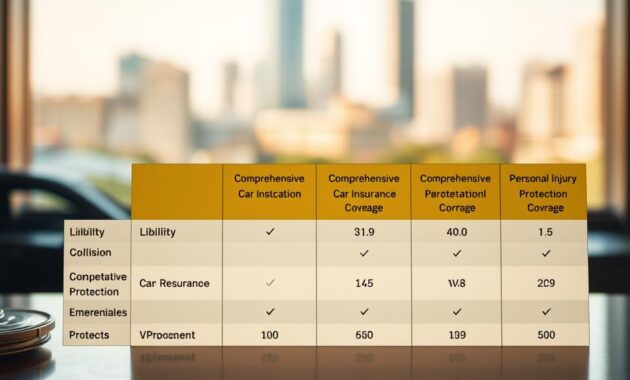Finding the right car insurance can be tough, but it’s key for your financial safety. With so many choices, it’s important to compare policies. This way, you get the best coverage at a good price.
The best car insurance keeps your vehicle safe and gives you peace of mind. By looking at different insurance companies, you can find the policy that fits your needs and budget.
Key Takeaways
- Compare car insurance policies to find the best coverage.
- Consider factors like price, coverage, and customer service.
- Look for insurance providers that offer discounts and flexible payment plans.
- Read reviews and check the insurer’s financial stability.
- Understand the terms and conditions of your policy.
Understanding Car Insurance Basics
Car insurance can seem complex, but knowing the basics is essential. It’s meant to protect your wallet if you’re in an accident or if your car gets damaged.
Types of Car Insurance Coverage
There are different types of car insurance. Here are a few:
- Liability Coverage: This covers damages to others if you’re in an accident.
- Collision Coverage: It pays for damages to your car if you crash.
- Comprehensive Coverage: This covers damages not from accidents, like theft or natural disasters.
Mandatory vs. Optional Coverage
Some car insurance is required by law, while others you can choose. Mandatory car insurance usually includes liability coverage. This is needed in most states. Optional coverage, like collision and comp, offers extra protection.
Factors That Affect Your Premium
Many things can change how much you pay for car insurance. Here are a few:
- Your driving history and record.
- The make and model of your vehicle.
- Your age and how long you’ve been driving.
- Your location and where you drive most.
Knowing these can help you find ways to lower your premium.
How to Find Car Insurance Near Me
Finding car insurance near you is easier with technology and local help. You can use many tools and resources to make your search faster.
Online Search Tools and Aggregators
Online tools and aggregators are great for comparing car insurance. Sites like NerdWallet and Bankrate let you get quotes from many providers. This makes it simple to see rates and coverage options.
Local Insurance Agents vs. National Providers
You can choose between local agents or national providers for car insurance. Local agents give personal service and know the area well. National providers offer more resources and policies, like State Farm.
Utilizing Insurance Company Locators
Insurance companies have locators on their websites to find local agents. These tools connect you with experts who can help choose the right policy. Experts say using locators makes finding car insurance easier.
“The key to finding the best car insurance is not just about the price; it’s about understanding your needs and finding a policy that matches them.”
Reading Customer Reviews and Ratings
Customer reviews and ratings are key to judging an insurance company’s service. Sites like Consumer Reports share insights on satisfaction, claims, and experience. Reading these can help you choose the right provider.
By using online tools, considering local and national options, finding locators, and reading reviews, you can find the right car insurance. It will meet your needs.
Top Car Insurance Providers in the United States
In the U.S., top car insurance providers offer many benefits and coverage options. They are known for their wide range of policies, great customer service, and competitive prices.
State Farm
Overview
State Farm is one of the biggest car insurance companies in the U.S. It has a huge network of agents and offers many coverage options.
Pros
- Wide Range of Coverage Options: State Farm has many coverage types, like liability, collision, and more.
- Excellent Customer Service: With a big network of agents, State Farm provides personalized service.
Cons
- Higher Premiums: State Farm’s prices can be higher than some other providers.
- Complex Claims Process: Some customers find the claims process complicated and time-consuming.
Features
- Drive Safe & Save: This program rewards safe driving with discounts.
- Multi-Car Discount: Discounts for insuring more than one vehicle under one policy.
Geico
Overview
Geico is a well-liked car insurance provider known for its low prices and easy-to-use online platform.
Pros
- Low Premiums: Geico is often praised for its affordable premiums.
- Easy Online Management: Geico’s website and app make managing your policy easy.
Cons
- Limited Personal Interaction: Being mostly online, some customers miss personal interaction.
- Varied Customer Service Experience: Customer service experiences can vary, with some facing long wait times.
Features
- Geico’s Rate Lock: This feature lets customers lock in their rate for a period, protecting against increases.
- Multi-Policy Discount: Discounts for combining auto insurance with other policies.
Progressive
Overview
Progressive is a well-known car insurance provider that offers a range of coverage options and innovative programs.
Pros
- Usage-Based Insurance: Programs like Snapshot offer discounts based on driving habits.
- Name Your Price: Allows customers to set their premium and adjust coverage.
Cons
- Rate Increases: Some customers have experienced rate increases after the initial period.
- Complex Billing: Billing can be complex, which is a problem for those with multiple policies or adjustments.
Features
- Snapshot: A usage-based insurance program that tracks driving habits.
- Bundle Discounts: Discounts for bundling multiple policies.
Allstate
Overview
Allstate is a major car insurance provider known for its wide range of coverage and various discounts.
Pros
- Comprehensive Coverage Options: Allstate offers a wide range of coverage types.
- Discount Opportunities: Many discounts are available, including for safe driving and bundling policies.
Cons
- Higher Premiums: Allstate’s premiums can be on the higher side.
- Complex Claims Process: Some customers report a lengthy and complicated claims process.
Features
- Drivewise: A program that tracks driving habits and offers rewards.
- Multi-Policy Discount: Discounts for combining auto with other insurance policies.
USAA (for Military Members)
Overview
USAA is a car insurance provider exclusively for military members and their families. It offers competitive rates and tailored services.
Pros
- Low Rates: USAA is known for its low rates for military members.
- Excellent Customer Service: USAA consistently ranks high in customer satisfaction.
Cons
- Eligibility Restrictions: USAA is only available to military members and their families.
- Limited Branch Access: While online services are robust, physical branch access is limited.
Features
- Military Discounts: Various discounts tailored to military service members.
- Flexible Payment Options: Offers flexible payment plans.
| Provider | Overview | Pros | Cons |
|---|---|---|---|
| State Farm | Large network, extensive coverage | Wide coverage options, excellent customer service | Higher premiums, complex claims |
| Geico | Competitive pricing, online platform | Low premiums, easy online management | Limited personal interaction, varied customer service |
| Progressive | Innovative programs, usage-based insurance | Usage-based discounts, flexible pricing | Rate increases, complex billing |
| Allstate | Comprehensive coverage, various discounts | Wide coverage options, discount opportunities | Higher premiums, complex claims |
| USAA | Military-focused, competitive rates | Low rates, excellent customer service | Eligibility restrictions, limited branch access |
Comparing Coverage Options and Pricing
When looking for car insurance, it’s key to compare coverage and prices. This helps you pick a policy that fits your needs.
Liability Coverage Comparison
Liability coverage is vital. It pays for damages to others if you’re in an accident. Insurers offer different levels of this coverage. Some may have umbrella policies too.
Experts say, “Having enough liability coverage is key to protect your assets in a lawsuit.”
“Liability coverage is not just about meeting the state’s minimum requirements; it’s about ensuring you have enough protection in case of a serious accident.”
Comprehensive and Collision Coverage
Comprehensive and collision coverage protect your car from various risks. The former covers theft, vandalism, or natural disasters. The latter covers damages from accidents. It’s important to compare deductibles and coverage limits.

Special Features and Add-ons
Many insurers offer special features like roadside assistance or rental car coverage. These extras can make your policy better. Look at what features each policy includes and if they meet your needs.
Discount Opportunities
Car insurance discounts can lower your premiums. Insurers offer discounts for safe driving, having multiple policies, or good grades. Comparing these discounts can help you save money.
By looking at these details, you can find a policy that balances coverage and cost well.
How to Choose the Right Car Insurance Policy
Choosing the right car insurance policy is important. It involves looking at several key factors. These factors can greatly affect your choice.
Assessing Your Personal Needs
To choose car insurance that fits you, start by thinking about your needs. Look at your vehicle’s value, how you drive, and your financial situation. For example, if you have a new car, you might want full coverage to protect it.
Reading the Fine Print
It’s important to read the fine print of your car insurance policy. Know what’s covered, what’s not, and the rules. As
“The devil is in the details,”
Balancing Cost and Coverage
Balancing car insurance cost and coverage is tricky. It’s tempting to pick the cheapest option. But, make sure you have enough coverage. Look at different quotes to find the best mix.
When to Reconsider Your Current Policy
It’s wise to reconsider your current car insurance policy sometimes. Changes in life, like moving or buying a new car, can change your insurance needs. Check your policy every year to make sure it’s right for you.
Conclusion
Choosing the right car insurance is very important. It can greatly affect your financial safety and peace of mind. Understanding the basics, comparing options, and looking at top providers are key steps.
Think about what coverage you need. Look at liability, collision, and other special features. State Farm, Geico, Progressive, Allstate, and USAA are top choices in the US. Each offers unique benefits and discounts.
To find the best car insurance, consider your personal needs and budget. Follow the advice in this article. This way, you can get a policy that fits your lifestyle and budget. You’ll enjoy financial security and peace of mind.



